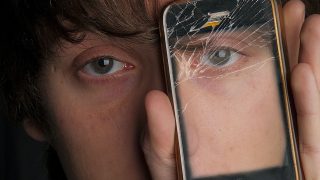Social media are fighting for the privacy of their users
There was a film about love „Loneliness in the network” starring Cielecka and Chyra, about that loneliness, now you can only dream.
Social media as well as the Internet are polarized, how strongly – we know from our own experience, from conversations, or rather disputes and arguments with friends, family gatherings, etc.
Tension has grown to such a level that it is necessary to urgently discharge. On the one hand, the loops of laws and regulations are tightening, on the other hand, users, who are aware of the benefits and rights, but also of the threats they face on the Internet, are definitely more efficient in taking care of their safety and privacy, and politicians and government institutions are more active in this field. It seems that finally the needs of users have been recognized by some giants of social media – smaller ones actively fight cybercrime and care about the privacy of Internet users, and what can boast of Facebook? It’s complicated, about which further on, first of all about those who care more.
Safety Mode
Since the beginning of September this year. Twitter is testing Safety Mode (pictured above) – a safe mode to protect users from abuse and violence on the platform. Posts will be automatically screened for aggressive content and their authors will be blocked. Automatic blocking will last 7 days. Tests to determine which users regularly interact aggressively to ensure that the algorithm doesn't block someone by mistake. In addition, those who use the Safety Mode function will be able to see which accounts have been automatically blocked in their defense, to edit this list if necessary.
Nothing like a ban
Short video recording service TikTok, on the other hand, as befits a behemoth with Chinese ancestry, acts more decisively and blocks content that threatens the safety of users, the most recent example being „Milk create challenge”;. Viral encouraged to stack milk crates in a pyramid and climb them like stairs. Participants had accidents while recording clips. Citing a violation of its terms of service, the platform removed all hashtags and prevented the publication of any content related to the action. Previously, there was a high-profile „blackout challenge” in which users recorded themselves choking to unconsciousness, then the death of a 10-year-old girl in Italy.
It’s complicated
A different approach to the protection of user privacy world's largest social network – Facebook. Recall that almost 2.9 billion users actively use it in a month (source: Statista, II. Quarter 2021), and the company's revenue, by its own admission, in only one, II. Quarter Br. have reached the dizzying sum of $29 billion. It comes almost exclusively from ad sales, and Facebook's business model is based on using data about users, their preferences, where they are, etc. to precisely serving them ads designed to be highly effective. Not surprisingly, the company is conservative about any suggestions that might even slightly influence user behavior, on which depend such parameters of the service as reach and engagement, on which stands its financial to be or not to be.
As revealed by the Wall Street Journal?
Meanwhile, the media is talking about another major scandal involving Facebook: executives were said to have hidden and downplayed knowledge of the harmful effects of using the site. A series of Wall Street Journal reports titled „The Facebook Files” provide evidence that Facebook has long conducted research for its own purposes, from which it knew that using its products was causing real harm and breeding negative effects on teenagers' mental health, including their self-esteem, but hid this information from the world and denied that it was harming the public.
After the Cambridge Analytica scandal with leaked user data for political campaigns, changes to the content distribution algorithm in 2018 targeted deeper user interactions with posts published by friends – as Zuckerberg declared, to make it easier for families and friends to connect, instead of – as it was before – encouraging passive and superficial use of professional external content. These changes, however, brought the opposite of the declared effects: deepened divisions between people, increased hate speech, harassment and violence, and thus attitudes based on negative emotions, as it turned out that they engage more strongly than positive emotions or discussions based on facts, thus strongly polarize and keep users active on the platform longer.
Social media in the opinion of many social experts and researchers, due to Facebook, has become more „angry”, with radical and extreme content dominating. James Barnes, a former Facebook employee, data scientist, considered one of the architects of the success of Trump's 2016 political campaign on social media (now an opponent of the former president) claims that Facebook had good intentions by correcting the algorithm in users' news feed to prefer engaging people. However, the platform has become so complex that the company did not understand that the changes could have the opposite effect.
Could it be that life is beyond even a company with such a powerful technological and intellectual base?
The implications for our privacy
Journalists, politicians, sociologists and even biologists and environmentalists have been raising concerns about Facebook's negative impact on societies for years.
We should be far from claiming that social media and Facebook are evil, but successive Facebook scandals make it increasingly difficult to believe in Zuckerberg's narrative, according to which the balance of benefits it provides to the world turns out to be positive.
Doubts can be seen even among American politicians of different options, so far using the benefits of advertising on Facebook during the election campaign. Now, having had enough of Zuckerberg's lawyering and evasions, united in an effort to undermine the power of the service, including even parceling out the giant into parts.
Whether these are real actions or just a game of appearances, time will tell. One thing is for sure: ordinary citizens will benefit from more protection of personal data and privacy on the web.


